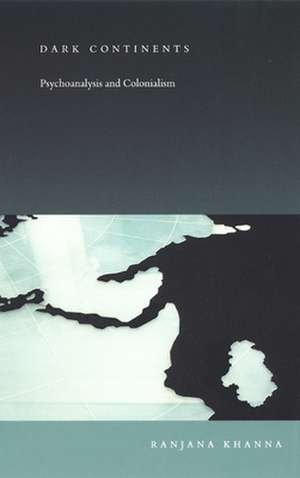Dark Continents – Psychoanalysis and Colonialism: Post-Contemporary Interventions
Autor Ranjana Khannaen Limba Engleză Paperback – 21 apr 2003
Din seria Post-Contemporary Interventions
-
 Preț: 194.51 lei
Preț: 194.51 lei -
 Preț: 159.67 lei
Preț: 159.67 lei -
 Preț: 203.53 lei
Preț: 203.53 lei -
 Preț: 239.81 lei
Preț: 239.81 lei -
 Preț: 310.83 lei
Preț: 310.83 lei -
 Preț: 210.08 lei
Preț: 210.08 lei -
 Preț: 258.90 lei
Preț: 258.90 lei -
 Preț: 239.54 lei
Preț: 239.54 lei -
 Preț: 241.11 lei
Preț: 241.11 lei -
 Preț: 312.96 lei
Preț: 312.96 lei -
 Preț: 335.51 lei
Preț: 335.51 lei -
 Preț: 307.74 lei
Preț: 307.74 lei -
 Preț: 231.22 lei
Preț: 231.22 lei -
 Preț: 239.54 lei
Preț: 239.54 lei -
 Preț: 266.77 lei
Preț: 266.77 lei -
 Preț: 265.20 lei
Preț: 265.20 lei -
 Preț: 309.49 lei
Preț: 309.49 lei -
 Preț: 229.09 lei
Preț: 229.09 lei -
 Preț: 300.06 lei
Preț: 300.06 lei -
 Preț: 266.55 lei
Preț: 266.55 lei -
 Preț: 299.29 lei
Preț: 299.29 lei -
 Preț: 305.61 lei
Preț: 305.61 lei -
 Preț: 308.72 lei
Preț: 308.72 lei -
 Preț: 266.77 lei
Preț: 266.77 lei -
 Preț: 238.99 lei
Preț: 238.99 lei -
 Preț: 262.32 lei
Preț: 262.32 lei -
 Preț: 203.18 lei
Preț: 203.18 lei -
 Preț: 262.91 lei
Preț: 262.91 lei -
 Preț: 240.35 lei
Preț: 240.35 lei -
 Preț: 203.56 lei
Preț: 203.56 lei -
 Preț: 264.82 lei
Preț: 264.82 lei -
 Preț: 210.08 lei
Preț: 210.08 lei -
 Preț: 300.06 lei
Preț: 300.06 lei -
 Preț: 306.99 lei
Preț: 306.99 lei -
 Preț: 265.97 lei
Preț: 265.97 lei -
 Preț: 195.41 lei
Preț: 195.41 lei -
 Preț: 211.04 lei
Preț: 211.04 lei -
 Preț: 221.33 lei
Preț: 221.33 lei -
 Preț: 266.47 lei
Preț: 266.47 lei -
 Preț: 209.85 lei
Preț: 209.85 lei -
 Preț: 232.87 lei
Preț: 232.87 lei -
 Preț: 268.46 lei
Preț: 268.46 lei -
 Preț: 310.08 lei
Preț: 310.08 lei -
 Preț: 303.11 lei
Preț: 303.11 lei -
 Preț: 301.97 lei
Preț: 301.97 lei -
 Preț: 267.70 lei
Preț: 267.70 lei -
 Preț: 267.15 lei
Preț: 267.15 lei -
 Preț: 203.34 lei
Preț: 203.34 lei -
 Preț: 311.22 lei
Preț: 311.22 lei
Preț: 264.26 lei
Nou
Puncte Express: 396
Preț estimativ în valută:
50.56€ • 52.79$ • 41.85£
50.56€ • 52.79$ • 41.85£
Carte tipărită la comandă
Livrare economică 05-19 aprilie
Preluare comenzi: 021 569.72.76
Specificații
ISBN-13: 9780822330677
ISBN-10: 0822330679
Pagini: 328
Dimensiuni: 227 x 324 x 78 mm
Greutate: 0.45 kg
Editura: MD – Duke University Press
Seria Post-Contemporary Interventions
Locul publicării:United States
ISBN-10: 0822330679
Pagini: 328
Dimensiuni: 227 x 324 x 78 mm
Greutate: 0.45 kg
Editura: MD – Duke University Press
Seria Post-Contemporary Interventions
Locul publicării:United States
Recenzii
"Ranjana Khanna articulates and outlines a transnational feminist ethics. Such an ethics is badly needed and awaited with eagerness by many. Dark Continents is, indeed, a terrific integration of psychoanalytic thought with postcolonial and feminist politics by way of a critical intimacy with the combined ethics of ambiguity and difference "-Mieke Bal, University of Amsterdam
Notă biografică
Textul de pe ultima copertă
"Ranjana Khanna articulates and outlines a transnational feminist ethics. Such an ethics is badly needed and awaited with eagerness by many. "Dark Continents" is, indeed, a terrific integration of psychoanalytic thought with postcolonial and feminist politics by way of a critical intimacy with the combined ethics of ambiguity and difference."--Mieke Bal, University of Amsterdam
Descriere
Argues that the psychoanalytic self was constituted through the specifically national-colonial encounters of the late 19th and early 20th centuries, and that therefore somewhat paradoxically perhaps, psychoanalysis is crucial for understanding postcoloniality and decolonization














